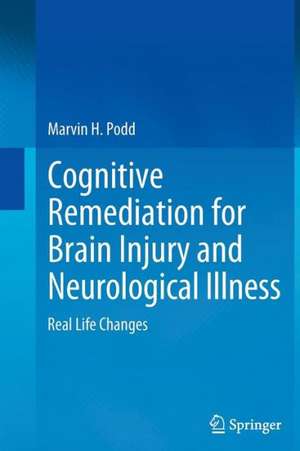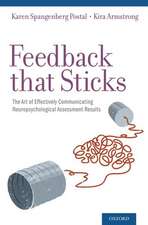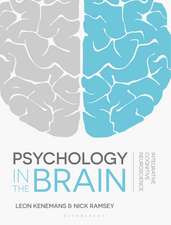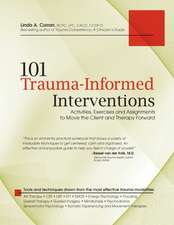Cognitive Remediation for Brain Injury and Neurological Illness: Real Life Changes
Autor Marvin H. Podden Limba Engleză Paperback – 25 ian 2014
| Toate formatele și edițiile | Preț | Express |
|---|---|---|
| Paperback (1) | 381.21 lei 6-8 săpt. | |
| Springer – 25 ian 2014 | 381.21 lei 6-8 săpt. | |
| Hardback (1) | 388.34 lei 6-8 săpt. | |
| Springer – 3 noi 2011 | 388.34 lei 6-8 săpt. |
Preț: 381.21 lei
Nou
Puncte Express: 572
Preț estimativ în valută:
72.95€ • 76.07$ • 60.63£
72.95€ • 76.07$ • 60.63£
Carte tipărită la comandă
Livrare economică 21 martie-04 aprilie
Preluare comenzi: 021 569.72.76
Specificații
ISBN-13: 9781493901142
ISBN-10: 1493901141
Pagini: 172
Ilustrații: XIV, 158 p.
Dimensiuni: 155 x 235 x 9 mm
Greutate: 0.25 kg
Ediția:2012
Editura: Springer
Colecția Springer
Locul publicării:New York, NY, United States
ISBN-10: 1493901141
Pagini: 172
Ilustrații: XIV, 158 p.
Dimensiuni: 155 x 235 x 9 mm
Greutate: 0.25 kg
Ediția:2012
Editura: Springer
Colecția Springer
Locul publicării:New York, NY, United States
Public țintă
Professional/practitionerCuprins
1. Introduction.- History of Cognitive Remediation.- Role Assessment in Treatment.- 4. Treatment Strategies.- 5. Cognitive Remediation with NeurXerxise.- 6. Treatment Generalization and Ecological Validity.- 7. A NeuroXercise Casebook.- 8. Conclusions.
Notă biografică
Marvin Podd, Ph.D. has been director of psychology training and research at the Naval Hospital in Bethesda, Maryland since 1989. There he develops and coordinates all aspects of the internship program; supervises interns; provides psychotherapy, neuropsychological attesting, and cognitive remediation; and conducts research in neuropsychology and cognitive remediation. He is also on the adjunct faculty of the Uniformed Services Uni versity of the Health Sciences. Dr. Podd is a member of the National Academy of Neuropsychology, American Psychological Association (Divison 40, Neuropsychology), and the Potomac Psychoanalytic Society, for which he served as president from 1993 through 1998. He has published and presented extensively on the subject of cognitive remediation.
Textul de pe ultima copertă
Planners, timers, and similar items have long been used to compensate for cognitive deficits after the brain recovers from injury or illness. Although such tools can be effective, they limit patients’ use of their own resources in their recovery. By contrast, cognitive remediation offers an alternative by using the brain’s intact structures in making up deficits, giving patients a greater sense of control than reliance on outside devices.
Cognitive Remediation for Brain Injury and Neurological Illness brings this modality into clear focus, providing both up-to-date data and a highly useful framework for treatment planning and intervention. This instructive volume explains the mechanisms behind cognitive remediation and makes the empirical case for its clinical use. Readers are taken through each stage of assessment and treatment, demonstrated by the innovative computer-based NeurXercise program, and a series of in-depth case examples shows the interventions in action.
Concise and practical, Cognitive Remediation for Brain Injury and Neurological Illness charts new paths toward patient recovery for neuropsychologists, health psychologists, and rehabilitation specialists.
Cognitive Remediation for Brain Injury and Neurological Illness brings this modality into clear focus, providing both up-to-date data and a highly useful framework for treatment planning and intervention. This instructive volume explains the mechanisms behind cognitive remediation and makes the empirical case for its clinical use. Readers are taken through each stage of assessment and treatment, demonstrated by the innovative computer-based NeurXercise program, and a series of in-depth case examples shows the interventions in action.
Concise and practical, Cognitive Remediation for Brain Injury and Neurological Illness charts new paths toward patient recovery for neuropsychologists, health psychologists, and rehabilitation specialists.
Caracteristici
Identifies commonly used neuropsychological test instruments for evaluating cognitive deficits, with emphasis on their input and output characteristics Contrasts these with NeurXercise computer-based exercises to highlight connection between testing and treatment Appendices are a quick reference for the input and output characteristics of common neuropsychological tests Includes supplementary material: sn.pub/extras














